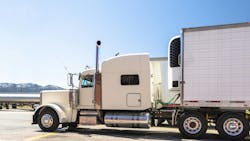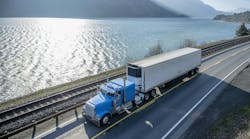Nuclear verdicts are raising the stakes for refrigerated carriers
Key takeaways
- Nuclear verdicts drive up insurance costs and require fleets to prioritize safety and documentation.
- Reefer operations face higher legal risk because of FSMA rules, temperature control, and multi-temp equipment complexity.
- Consistent safety culture, data management, and operational discipline reduce litigation exposure and protect fleets.
A July run between Phoenix and San Antonio. Triple-digit heat. A dock delay pushes the clock. A multi-temp unit throws an alarm.
None of this is unusual in refrigerated transport. What has changed is the legal and financial interpretation in case a serious road incident follows. The records left behind, such as logs, alarms, schedules, and incentives, now speak as loudly as eyewitnesses.
Across the industry, eight-figure “nuclear verdicts” have reshaped how risk is priced and argued. Transportation is often in the spotlight, and refrigerated operations offer plaintiffs more threads to pull: temperature control, food-safety obligations, and high-value cargo that expands the claimed damage.
Nuclear verdicts and their impact on fleet risk and liability
The label generally applies to jury awards exceeding $10 million. The number matters, but the ripple effects matter more: years of defense work, appeals that drain time and capital, reputational damage, and insurance market reactions. Even when a headline award is trimmed or reversed, the interim period is often punishing. Scrutiny from shippers, brokers, lenders, and insurers intensifies; underwriting tightens; documentation and safety culture move from footnotes to focal points. An appellate example arrived with the Texas Supreme Court decision involving Werner Enterprises, which reversed a prior verdict. The case illustrates that outcomes can change on appeal, though appeals require time and resources.
Nuclear verdicts driving fleet costs and contract challenges
On the balance sheet, the pattern is familiar: litigation consumes management time and cash, premiums and retentions can rise, and some markets might step back. Contracting parties respond with tougher requirements around records and safety performance. Public safety narratives (prior violations, log inconsistencies) travel beyond the courtroom to shippers, brokers, and lenders. As reported earlier, nuclear-verdict trends are driving up premiums and reshaping risk strategies across trucking, reinforcing those pressures.
Crucially, large outcomes rarely hinge on a single split second. The story that persuades a jury often centers on systems like hiring, training, supervision, maintenance, and hours of service (HOS), told through the records those systems create. That emphasis is pushing the industry toward a harder conversation: not how to “perform” safety, but how to practice it under real operating constraints.
Reefer fleets face higher legal risk from FSMA and temp compliance
Refrigerated transport operates at the intersection of safety, food security, and high-value logistics. The Food Safety Modernization Act’s (FSMA’s) Sanitary Transportation Rule sets out responsibilities for temperature control, sanitation, equipment suitability, and recordkeeping across shippers, loaders, carriers, and receivers. Operational realities escalate the stakes: long detention at warm docks, scarce legal parking, tight delivery windows, and complex equipment (multi-temp configurations; controller/telematics data that logs alarms, set points, and door events). These factors create a fuller portrait of decision-making under pressure.
In refrigerated trucking, standard operating procedures for temperature control and data integrity are central. Prior infractions (however minor) may be presented to suggest an ongoing disregard for safety and compliance. The larger and more systemic the pattern appears, the easier it becomes to argue for punitive components in jurisdictions that allow them.
Safety and data questions reefer fleets must solve to reduce risk
The current verdict climate is prompting carriers, brokers, and shippers to ask blunter questions about their operations:
Signal vs. noise in data. Controllers and independent recorders capture rich temperature histories. The issue isn’t whether data exists; it’s whether the organization notices and prioritizes the right signals early (such as alarms, pull-down failures, and door-open patterns) and whether those signals translate into feasible decisions on the road.
Human limits in hot lanes. Southwest and Gulf corridors make “make-up-time” pressure predictable. The safety conversation is shifting from punishing individual drivers to designing routes, freight windows, and parking assumptions that acknowledge real bottlenecks.
Incentives that match stated values. If pay plans favor on-time delivery above all else, plaintiffs can and do argue that speed and HOS shortcuts were rational responses. Balanced scorecards with safety events, compliance, and equipment care reflect a strategic change.
Maintenance reality. Time-stamped service and calibration records matter, but so does the maintenance backlog itself. If juries hear about parts delays, shop staffing, and whether critical alarms were recurring, the signal they take is whether issues were manageable exceptions or the background music of the operation.
Shared accountability. FSMA disperses responsibility across the chain. Shipper loading practices, receiver dock performance, and broker scheduling play into what happens on the road. Contracts and lane design that acknowledge thermal realities reduce downstream finger-pointing.
Safety culture and docs boost fleet legal and insurance standing
Trials and depositions repeatedly spotlight whether temperature procedures existed and whether routine behavior followed them. The distinction is less about perfect documentation and more about coherence:
- Pre-cool expectations that match dock behavior
- Alarm trees that drivers can execute without breaking HOS
- Dispatch messages that align with written policies
- Coaching that shows up before incidents
In refrigerated operations, the paper trail functions as a by-product of this coherence, not a substitute for it. From the insurance market side, specialist commercial auto liability insurers like Star Mutual RRG report close attention to the same signals because they correlate with frequency and severity over time. In other words, the things that tend to persuade jurors that an operation is serious about safety are often the same things that persuade insurers the risk is controllable.
Aligning safety, compliance, and ops to prevent major claims
Nuclear verdicts are not just a litigation trend; they are a stress test of how safety, productivity, and food-grade requirements coexist when conditions are at their worst. For reefers, the questions are practical:
- Can schedules absorb detention in heat without pushing HOS?
- Do lane guides reflect parking scarcity?
- Do incentives and coaching pull in the same direction when alarms sound at mile 700?
When those answers align, the legal narrative changes. And so do insurance conversations.
Long-term safety habits shield reefer fleets from verdicts and risk
Weather and juries cannot be controlled. What can be shaped is the fit between business realities and safety practices so that the everyday decisions captured in logs and data reflect a consistent priority: people first, then business. In refrigerated transport, alignment between business realities and safety practice increasingly separates routine incidents from existential ones.
About the Author

Kate Lu
Kate Lu is part of the editorial team at Star Mutual Risk Retention Group, which provides commercial auto liability coverage to transportation businesses. The editorial team tracks litigation, safety, and market trends affecting carriers and logistics operators.


